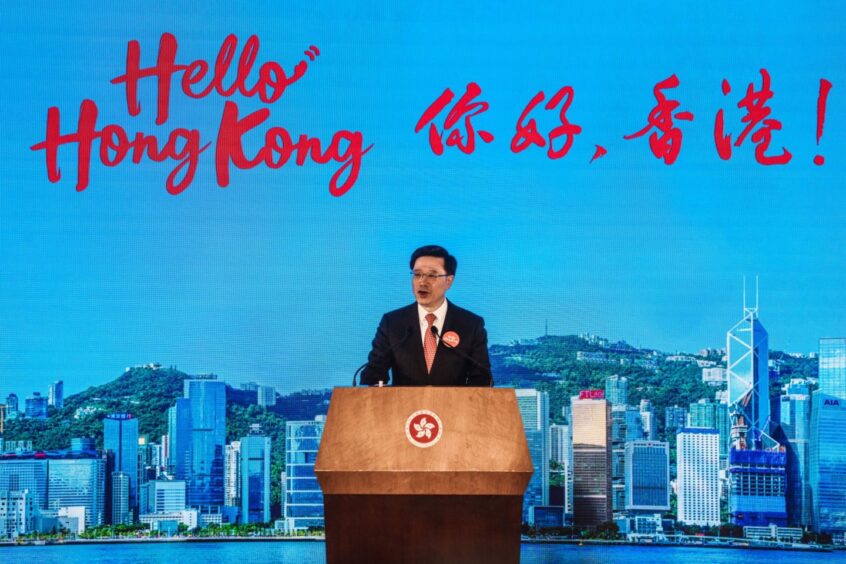
Two months after Chinese President Xi Jinping visited Saudi Arabia, Hong Kong’s leader John Lee has followed in his footsteps by taking a sizeable entourage to the kingdom.
Lee, who wrapped up a two-day trip to Saudi on Monday, made it clear his goal is to persuade oil giant Saudi Aramco to list in the financial hub despite competition from rivals such as New York and London. Such a move would be a major victory for Lee, who, since taking power in July, has focused on reopening Hong Kong after years of pandemic isolation battered the city’s economy and reputation.
Aramco has a market capitalisation of about $1.9 trillion, more than four times that of Tencent Holdings Ltd., the most valuable stock on the Hong Kong exchange. Securing such a listing would not only add much-needed diversity to the China-dominated bourse, which has seen $2.3 trillion erased in the past two years as global investor confidence in the country collapsed, but also further Xi’s aims of deepening ties with the Gulf.
“When China is thinking about new partners, new allies, it’s seeking to use Hong Kong more from the financial perspective,” said Dongshu Liu, assistant professor specialising in Chinese politics at the City University of Hong Kong. “If you’re talking about financial cooperation between those countries, a big hub is needed.”
Hong Kong is pushing hard. The city — in cooperation with mainland exchanges — is changing rules to allow China’s retail investors to buy shares of overseas-based companies listed on the local bourse for the first time. That would include Aramco, if it conducted a dual primary listing in the city.
Lee met Aramco’s president Amin Nasser during his visit and said the city would support a listing and handle future funding arrangements, according to a Hong Kong government statement. The visiting group included Nicolas Aguzin, the chief executive officer of Hong Kong Exchanges & Clearing Ltd., as well as government ministers responsible for trade and financial services.
During the trip, HKEX and the Saudi Tadawul Group Holding Co., the country’s bourse, signed a pact to cooperate in areas including cross listings, an initial step that could facilitate the sale of shares in Hong Kong.
An Aramco share sale would provide “a big boost to the city’s status as an equities hub,” said Sharnie Wong, an analyst at Bloomberg Intelligence in Hong Kong.
Xi has been looking to capitalise on China’s growing importance to the Middle Eastern country, especially as US-Saudi ties run into turbulence. China is Saudi Arabia’s biggest crude customer, while the two countries signed agreements worth some $50 billion following Xi’s visit in December. Xi has tasked Lee with reinforcing the country’s pivot to Belt and Road countries to provide a counterbalance to a US-dominated world.
There is also Lee’s priority of shoring up Hong Kong as an international finance center as concern mounts in Western capitals over the erosion of civil liberties. As a result, the former British colony is looking to cement ties with Middle Eastern and Southeast Asian countries which may have fewer qualms over the jailing of pro-democracy figures and concerns the city’s rule of law has been eroded, with local officials recently traveling to Vietnam and Thailand.
The city’s reliance on Chinese initial public offerings in the past decade meant the local bourse is vulnerable to swings in global sentiment toward the nation as well as relations with the US. The Hang Seng Index plunged to a 13-year low in October as investors took fright over crackdowns on private enterprise and the pursuit of Covid Zero. Tighter rules on Chinese companies listing overseas on national security concerns meant a sharp drop-off in share sales in Hong Kong, with IPO proceeds in the city last year slumping 69% to the lowest since 2012.
Aramco raised $29 billion in its initial public offering in Riyadh in 2019, making it the world’s largest debut. The offering relied heavily on local investors, with the Saudis shunning foreign bourses amid valuation disagreements. The Saudi government owns about 94% of the company’s listed shares, a proportion similar to major Chinese energy firms. PetroChina Co., the country’s biggest oil producer, is 90% held by the state.
Riyadh is seeking to strengthen relations with crucial trade partners, including China. During Xi’s visit, the countries agreed to boost coordination on energy policy and exploration, including the use of the Chinese currency for oil and gas trade settlement.
Lee and his entourage traveled to the United Arab Emirates on Tuesday and will return to Hong Kong on Saturday.